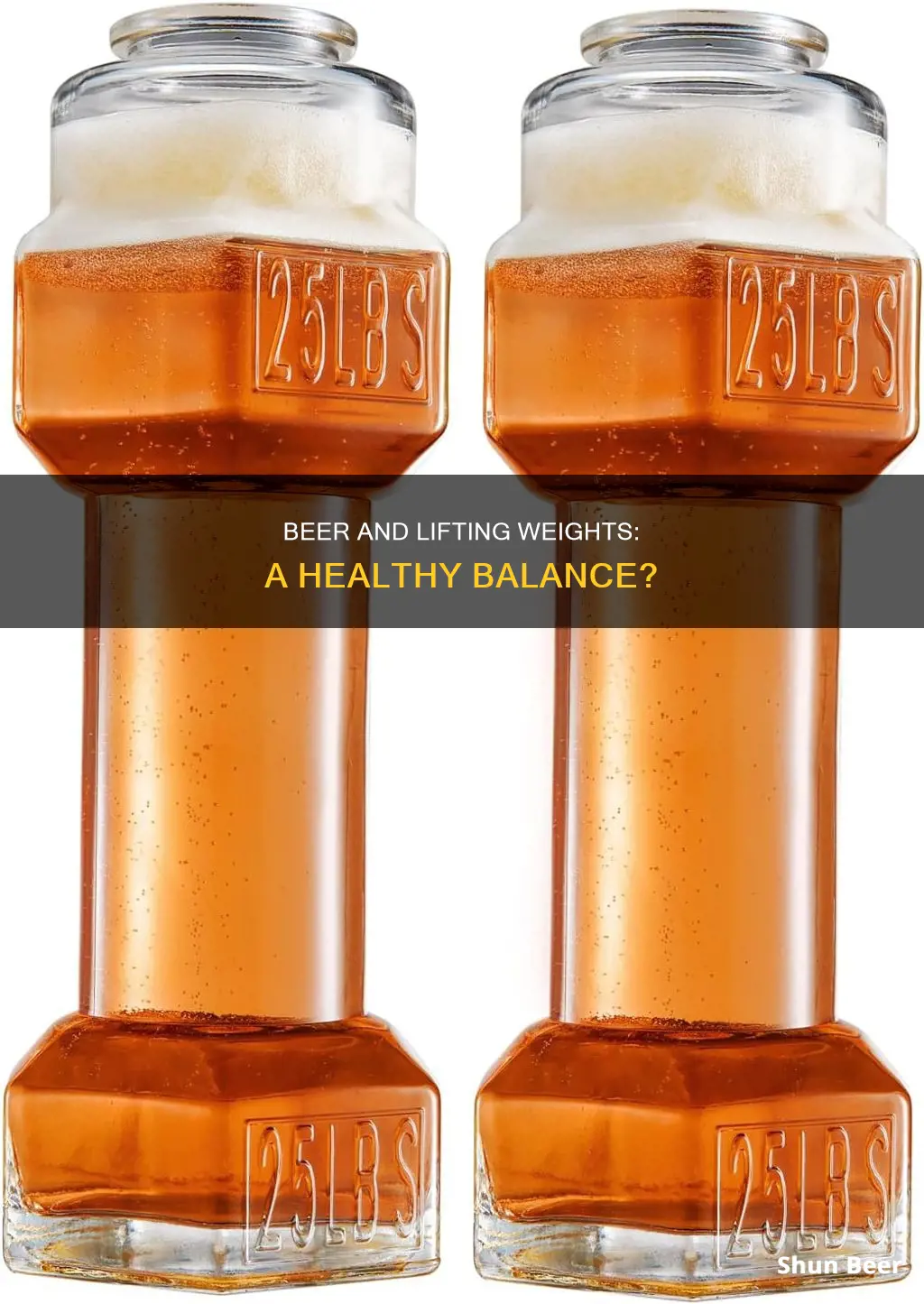
Drinking beer and lifting weights is a tricky combination. While it's not recommended to drink excessively before or after lifting weights, some studies suggest that drinking a low-alcohol beer after endurance sports can have potential benefits. Light beer, for example, can be a decent recovery aid and hydrator post-exercise. However, it's important to note that drinking more than one or two beers can lead to issues such as higher water loss, reduced muscle gains, and impaired judgment. Additionally, alcohol can slow down your metabolism, weaken your muscles, and cause fatigue. Therefore, it's crucial to prioritize rehydration and electrolyte restoration after working out, and drinking alcohol may not be the best option for optimal recovery.
| Characteristics | Values |
|---|---|
| Effect on muscle protein synthesis | Alcohol consumption can inhibit muscle protein synthesis, impairing muscle recovery. |
| Effect on testosterone | Alcohol decreases testosterone levels, which can reduce muscle growth. |
| Effect on growth hormone | Alcohol decreases growth hormone levels, which can also reduce muscle growth. |
| Effect on hydration | Alcohol is a diuretic, increasing the need to urinate and causing dehydration, which hinders recovery. |
| Effect on calorie intake | Alcohol contains calories but few nutrients, contributing to weight gain. |
| Effect on food consumption | Alcohol lowers inhibitions, leading to increased food consumption. |
| Effect on performance | Alcohol impairs sports performance by affecting the body physically and impairing brain functions, including judgment. |
| Effect on safety | Alcohol impairs judgment and motor functions, which can be dangerous when lifting heavy weights. |
| Effect on anxiety | Alcohol can lower anxiety and increase confidence, which may be beneficial for some lifters. |
| Effect on socialising | Drinking beer can be a social activity, helping people stick to their fitness routines. |
What You'll Learn
- Beer can be a good post-workout hydrator, but only if it's low ABV
- Alcohol impairs muscle protein synthesis and promotes dehydration
- Drinking alcohol after a workout can hinder muscle growth
- Alcohol negatively impacts your testosterone levels and fertility
- Drinking alcohol before a workout can be dangerous

Beer can be a good post-workout hydrator, but only if it's low ABV
Beer has long been considered detrimental to athletic performance, but recent studies have shown that it can be a good post-workout hydrator—if it's a low-ABV beer.
Beer is not inherently bad for your health or fitness. In fact, it contains carbohydrates and sodium, which can be beneficial post-exercise. Carbohydrates and sodium help the body recover after a workout, and polyphenols, which are antiviral plant compounds, can reduce the chances of respiratory infection associated with heavy training.
However, the benefits of drinking beer after a workout only apply to low-ABV beers—those with less than 4% alcohol content. Once you go over 4% alcohol content, or have more than one or two 12-ounce low-ABV beers, the benefits decline. Higher alcohol content can lead to issues such as increased water loss, reduced muscle gains, impaired protein synthesis, and a negative impact on overall training performance.
Additionally, it's important to pair beer with food or another drink that helps replenish electrolytes lost during exercise. This helps limit diuresis, the process that makes the body release excess fluid.
While non-alcoholic beer doesn't affect strength when consumed in moderation, it's important to note that excessive beer drinking, regardless of alcohol content, is not recommended by health professionals.
So, if you're looking to crack open a cold one after a workout, stick to low-ABV beers and consume them in moderation.
Drinking Beer on Daytona Beach: What's Allowed?
You may want to see also

Alcohol impairs muscle protein synthesis and promotes dehydration
Alcohol is a diuretic, which means it increases urine production. When alcohol enters the bloodstream, it suppresses the release of the antidiuretic hormone vasopressin, which controls how much water the kidneys reabsorb and retain. This reduction in fluid retention and increase in urination can lead to dehydration.
Dehydration can cause muscle cramps and loss of muscle mass over time. It is, therefore, important to stay hydrated, especially when consuming alcohol.
Alcohol also inhibits or disrupts certain signaling pathways that tell the body to build muscle. This disruption can slow down your metabolism, weaken your muscles, and cause fatigue.
To counteract alcohol-induced dehydration, it is recommended to:
- Drink alcohol in moderation
- Drink water while consuming alcohol
- Drink water regularly
- Consume hydrating foods with high water content
It is also important to note that heavy drinking can lead to lower testosterone levels and impaired fertility in men.
Breastfeeding and Alcohol: Is Red Beer Safe?
You may want to see also

Drinking alcohol after a workout can hinder muscle growth
Alcohol also affects hormone production, including testosterone and growth hormones, which are important for muscle growth and recovery. Both acute and chronic ingestion of alcohol lower testosterone levels, with heavy drinking for men considered to be more than 15 drinks per week. Lower testosterone levels can lead to decreased sperm production and altered production of other reproductive hormones. Alcohol also increases cortisol levels, which can lead to increased tissue breakdown if levels remain elevated for long periods.
While moderate alcohol consumption may not have a significant impact on muscle growth, excessive drinking can disrupt the body's ability to absorb nutrients and impair muscle recovery. A study showed that consuming alcohol after exercise reduced muscle protein synthesis by 24% when combined with protein and by 37% when combined with carbohydrates. This indicates that alcohol can hinder the body's ability to repair and build muscle even when optimal nutrition is consumed.
Overall, while occasional drinking may not have a significant impact on muscle growth, regular and excessive alcohol consumption can hinder muscle growth and recovery by disrupting hormone production, nutrient absorption, and the body's ability to rehydrate and restore electrolytes.
After-work beer: A harmless habit or a slippery slope?
You may want to see also

Alcohol negatively impacts your testosterone levels and fertility
Heavy alcohol consumption, typically defined as more than 15 drinks per week for men, can cause short-term and long-term changes to testosterone levels. Research has found that testosterone levels can drop in as little as 30 minutes after drinking alcohol. Acute alcohol consumption can cause short-term impairments in testosterone release by negatively affecting the hypothalamus and pituitary gland.
Alcohol interferes with the function of the male reproductive system, which consists of the hypothalamus, pituitary gland, and testes. It can disrupt testosterone production by interfering with the hypothalamus, pituitary gland, and testes. Alcohol can decrease the production, release, and activity of luteinizing hormone (LH) and follicle-stimulating hormone (FSH), which are critical for reproductive functions.
Additionally, alcohol impairs the function of Sertoli cells in the testes, which are necessary for sperm maturation. Studies have found that heavy drinkers are more likely to have spermatogenic arrest, which is an interruption in sperm development that can lead to low sperm concentration. Alcohol can also lead to a decrease in semen quality and volume.
The impact of alcohol on fertility is not limited to men. Prenatal exposure to alcohol can negatively affect the fertility of male offspring in the future. A study found that the sperm concentration among sons of mothers who drank heavily during pregnancy was significantly lower compared to those exposed to less alcohol.
Quitting alcohol or reducing alcohol intake to moderate levels can help reverse some of the damage caused by chronic drinking. Moderate alcohol consumption is typically defined as no more than one drink per day for women or two drinks per day for men.
Beer and Pancreatitis: What You Need to Know
You may want to see also

Drinking alcohol before a workout can be dangerous
Drinking alcohol before a workout can negatively impact your coordination, balance, and judgment. Even a small amount of alcohol can affect your spatial awareness, making you more prone to tripping or dropping weights. The more alcohol you consume, the worse your athletic performance will be.
Alcohol is a diuretic, which means it increases urine production and can lead to dehydration, especially when combined with the sweat from a workout. Dehydration can cause muscle fatigue and increase the risk of a heart arrhythmia, which is a serious condition involving abnormal heart rhythms.
As a depressant, alcohol slows down your body's functions. It impairs your reaction time, strength, endurance, and aerobic capacity. These effects can make your workout less effective and potentially dangerous. The full effects of alcohol may not be felt immediately, and you may not feel drunk until well into your workout, increasing the risk of injury.
Alcohol also interferes with protein synthesis, which is necessary for muscle recovery and growth. Consuming alcohol after a workout can prolong the time it takes for your body to recover and build muscle. Additionally, alcohol provides empty calories, which can hinder weight loss and contribute to weight gain.
If you plan to drink alcohol and work out, it is essential to wait as long as possible between drinking and exercising. Drinking plenty of water and eating a solid meal before drinking can also help minimize the negative impacts. It is recommended to keep the workout short and light, avoiding intense or strenuous activities.
In conclusion, while it may be tempting to combine post-work happy hours with workouts, drinking alcohol before exercising can have detrimental effects on your body and performance. It is crucial to prioritize your health and well-being by either abstaining from alcohol or ensuring sufficient time and hydration before engaging in physical activity.
Is Beer Safe During Pregnancy?
You may want to see also







